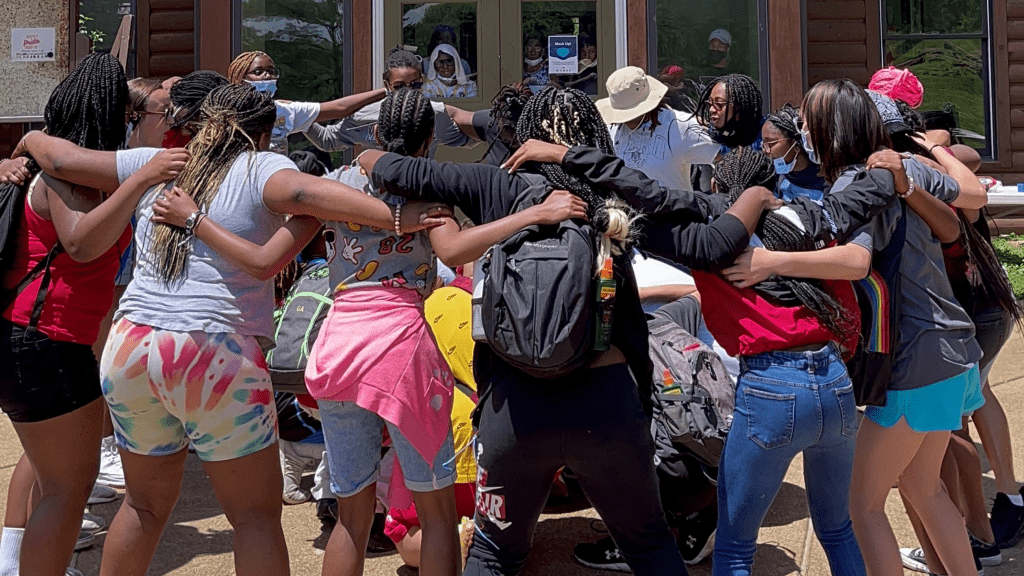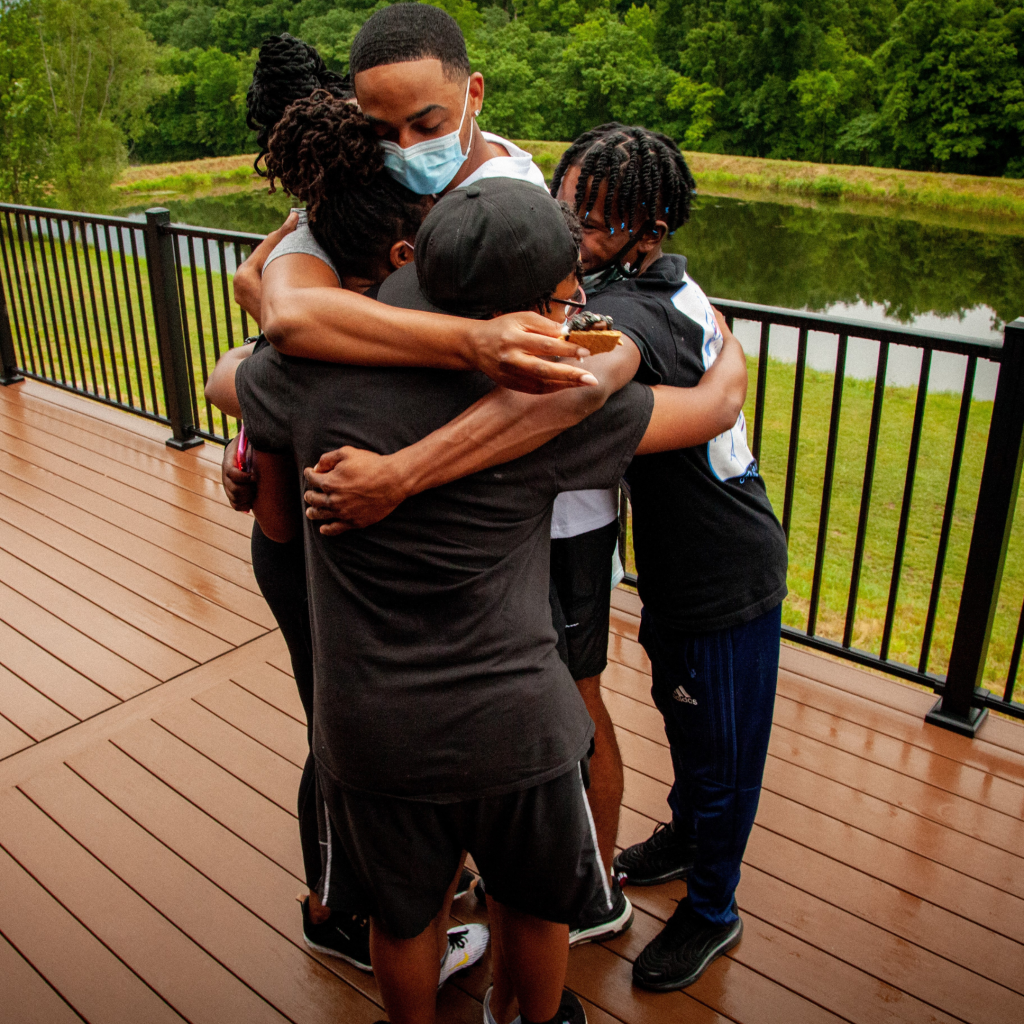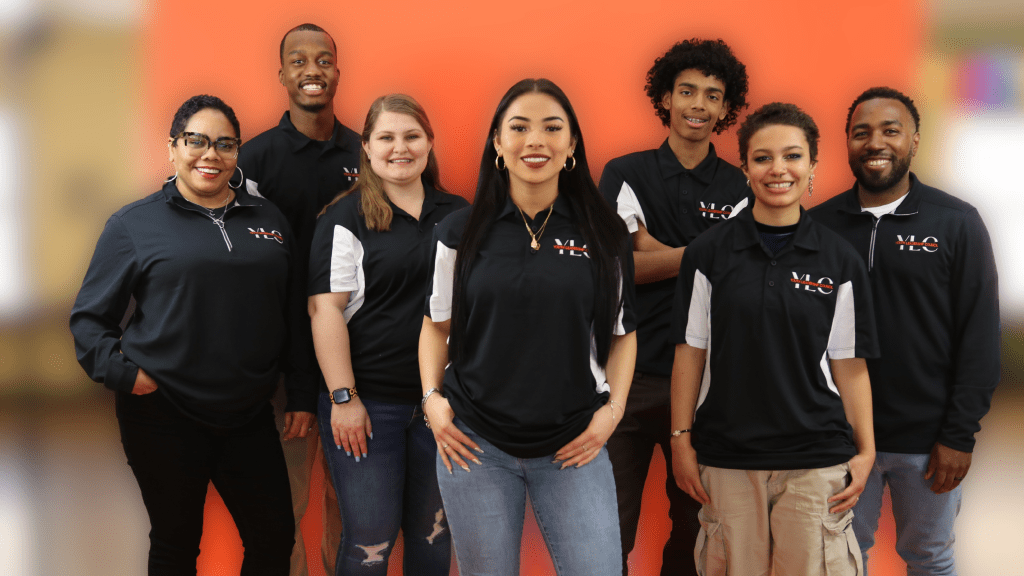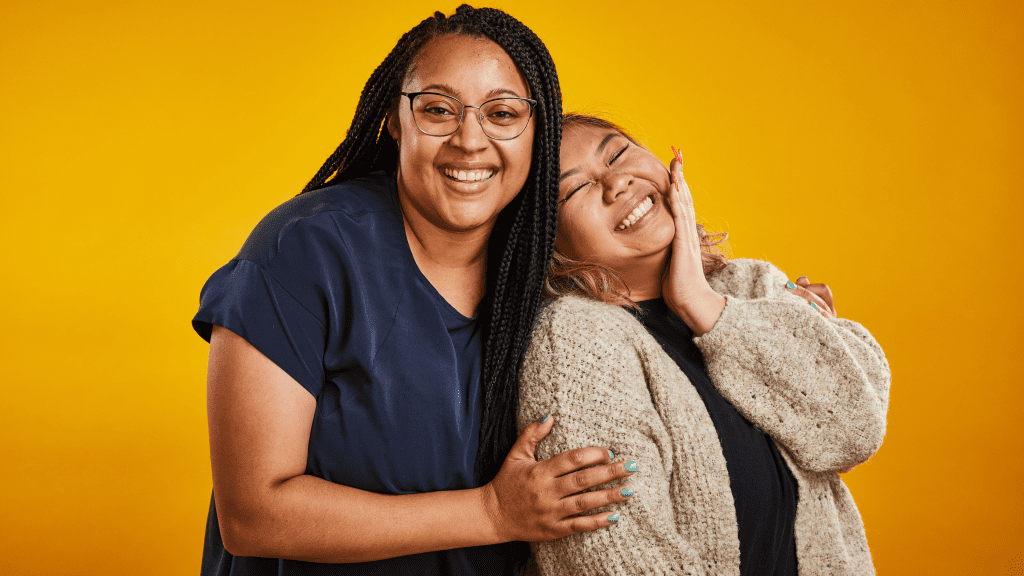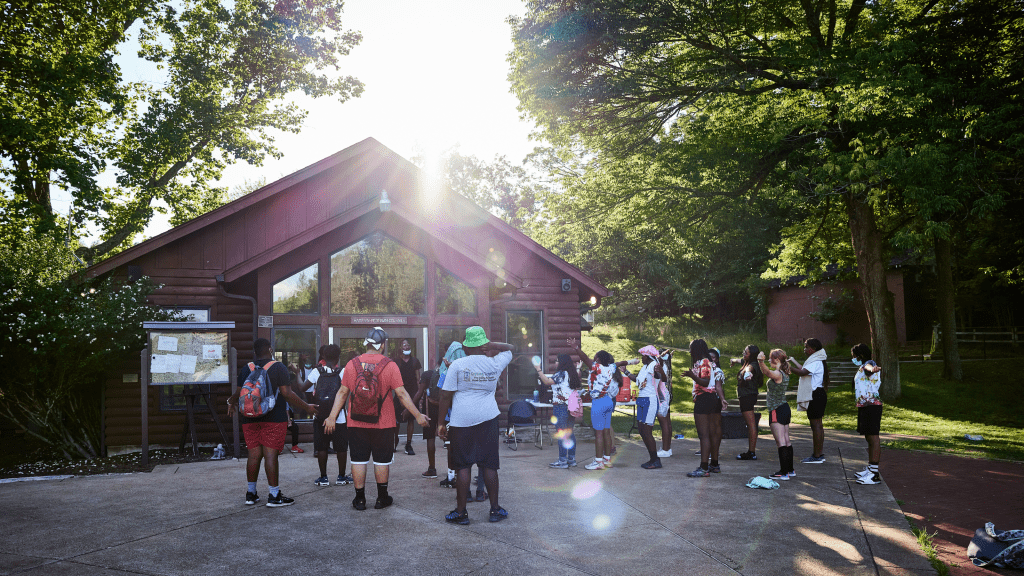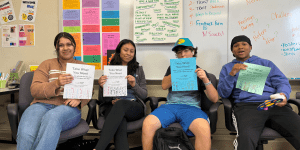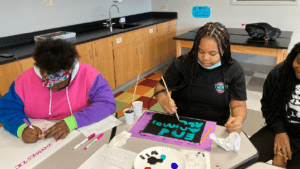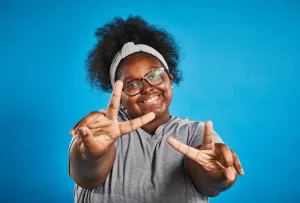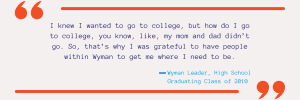By Nicki Thomson, PhD, Senior Director of Research and Learning (Wyman) & Florian Sichling, PhD, Assistant Professor of Social Work, University of Missouri-St. Louis
Several recent blog posts have called attention to the negative consequences of loneliness and lack of social connections, particularly among our nation’s youth and those who identify as members of a historically marginalized group. It is clear, now more than ever, that young people need opportunities to connect and develop relationships with others to build social-emotional skills and buffer life’s challenges. Each of Wyman’s proven programs supports the development of positive, healthy relationships through a unique array of activities, experiences, and curriculum tailored to specific goals.
Wyman Leaders, in particular, is anchored in the strong relationships students develop with Wyman staff and their peers over time. These relationships support young people’s positive development during the program and well beyond.
What is Wyman Leaders?
Wyman Leaders launched in 2002 and currently serves more than 300 students annually who face economic and systemic barriers. Our positive youth development approach anchors for two key areas of the program: Education & Career, and Leadership & Community Engagement. Young people in the program receive the supports needed to gain awareness of their personal strengths and career interests, develop career readiness skills, and to enroll in and complete postsecondary education. The program also fosters youth leadership and community engagement – developing a diverse pipeline of future leaders who will make a positive difference in the lives of others.
New Wyman Leaders participants are nominated in their 8th grade year and begin their journey with a 3-week overnight summer camp experience before they begin high school. They finish the program four years after high school graduation. Throughout their experience, Wyman Leaders engage in intensive summer activities tailored to the needs of their age group, focusing on social-emotional learning, leadership development, and exposure to postsecondary and career options. Throughout the school year they participate in group events and workshops and receive one-on-one support from trained Wyman staff.
Since its inception, more than 1,400 St. Louis area young people have engaged in the program.
What impact does Wyman Leaders make on teens’ lives?
Our results consistently show that Wyman Leaders youth build social-emotional and leadership skills, graduate from high school on-time, and enroll and persist in postsecondary education at rates that meet or exceed regional and national benchmarks. Research also shows that students served by the Wyman/Missouri State University partnership maintain higher GPAs (2.88 vs. 2.40) and achieve higher retention rates in their first year of college (95% vs. 79%) than peers from the same high schools (Reed, Thomson & Bramman, 2018).
Further, an analysis of postsecondary enrollment and graduation records of 500 program alumni indicate they completed a 6-year degree or credential program at a rate that far exceeds youth with similar demographic characteristics (Thomson & Sichling, 2023). The analysis also showed no difference in degree completion by race/ethnicity—a promising finding that runs counter to the persistent racial inequities in postsecondary education.
What is the role of relationships in Wyman Leaders?
From 2020 to 2023, Wyman’s Research & Learning team, in partnership with Dr. Florian Sichling at the University of Missouri-St. Louis, engaged 82 Wyman Leaders alumni in in-depth interviews to learn about their life trajectories and reflections on their experiences. A prominent theme emerging from this work was the critical importance of relationships with both adults and peers. The way relationships operate in Wyman Leaders to produce positive outcomes for youth is threefold:
- Positive adult role modeling of college and career options;
- Providing emotional support, particularly during stressful events and life transitions; and
- Connecting youth to peers from diverse backgrounds.
Role Modeling College & Career Options: Many alumni referenced how Wyman staff shaped their future aspirations, simply by being a positive adult role model—someone with whom they formed a relationship and who they admired. Wyman Leaders could see themselves taking a career path they may not have known about or considered before. These relationships, coupled with direct coaching on college and career options, helped youth make important decisions about their futures.
And also the fact that a lot of my counselors were working in social work and going for their degrees in sociology it really warmed me up to the idea of a more humanist career path…so I would say…my decision to go into psychology was slightly influenced by that after I switched over from biological sciences. And so my current career path that I’m aiming for, as a school psychologist, I’d say was influenced by that as well.
The most important relationships were through my staff. I got the chance to meet different staff there that showed us that even though they were, like, older than us, that they were no different… it was amazing because they went through the same process that we went through and I met some that did music and did all these types of different majors and career fields that they were in, and just to be able to learn from them and build that type of relationship, have them reach out, like, as you go into college. Yeah, to get that feedback from them of how they, what was their college experience going through… is just, is just amazing.
Providing Emotional Support: Interviews revealed that youth relied on the relationships they developed in Wyman Leaders as a support system; an extra layer of support in addition to their families. This was particularly helpful during times of family crisis and transition to college. Emotional support from Wyman Leaders staff during college was critical, as many were first-generation students.
Wyman from the top all the way to the bottom, showed up to both of my parents’ funeral[s]. So, my father passed when I was a freshman in high school, my mother passed when I was in my last semester of grad school. They were at both of them. So throughout the whole time they were constantly checking up on me, calling me, texting me, going out to dinner, sending me cards, sending the invitations. So <Wyman Staff Member>, when she came to my mother’s funeral, she just really saw how distraught I was…she knew I kind of needed to get out and get some fresh air, and she saw the pain I am in. She was like, “I can get her out the house I can put her around people she loves and I can get her a break from life.” I’m so appreciative of that because I needed that at that time.
It goes back to those connections that are made because one, I knew I wanted to go to college, but how do I go to college, you know, like, my, my mom and dad didn’t go. So, that’s why I was grateful to have people within Wyman to get me where I need to be. And I think this has kind of helped me along the way. Because you can’t do everything in this world by yourself, we all need help. So Wyman gave me that help.
When you have people besides your family, your immediate family, wanting you to be the best you and wanting nothing in return…to have people invest in you, who are not gonna get anything out of it, but to solely help you – it takes you from here to over the moon. And she was definitely one of my people.
Connecting Youth to Diverse Peers: Alumni talked about the personal growth they experienced because of creating relationships with peers. In particular, they noted the benefit of interacting and connecting with peers from backgrounds different from their own, as well as a mix of different personality types. Relationships with diverse peers foster the development of positive attitudes toward members of different groups, helping to create a more inclusive environment. Interview data also revealed the longevity of the peer relationships initially formed in Wyman Leaders; many alumni continue to reap the benefits of these life-long friendships well into adulthood.
So, my experience has been amazing even to this day, like I still keep in contact with a bunch of people from Wyman and mentors and staff members and it’s pretty cool because I met them when I was 12 and like I said I’m turning 30 this year so it’s pretty cool the transformation and all the experiences.
And I think that’s because Wyman has influenced that in me so much, because they helped me so much. And they instilled in us a sense of community and being able to lean on each other. I still talk to people who I went to camp with to this day. Because that’s what they taught us.
[I was} pretty different from most of the kids that were part of it that first year. Like I said, I didn’t think I’d fit in. I think most…of our group was from St. Louis and even though I was just from St. Charles, my family spent a lot of time like at the lake, camping, hunting, and fishing. There’s only a few of us…that ever did that. Yeah. Very different. But honestly, that’s it. It wasn’t that bad, though. Like we were pretty quick to all just become friends. So it didn’t really matter. Just that was just the most challenging for me to get past that idea.
Honestly, I think the biggest thing was just that, like, I don’t know why I hesitate to even call this a challenge. It was really a kind of a blessing. A big challenge was that I was a part of this program with a lot of people who are very different from me that I have never had the opportunity to get to know in the place that I live, okay. So, you know, it was not a very diverse community. And you know, kind of comfortable in my own little world back then. So again, like I even called it a challenge because in reality I think if you had asked me what is the greatest gift I got from this experience I would probably say the same thing but just that I was out of my comfort zone in a lot of ways.
Call to Action
Serving young people in the Wyman Leaders program is part of the solution to persistent, historical inequities in postsecondary education enrollment and completion. It is also a meaningful step toward creating a more diverse workforce of tomorrow’s leaders. We invite you to partner with us to sustain this work, and to help more young people build the relationships that are critical to their current and future success.
How can you help?
Share this with your network and advocate for the teens in your life. You can make sure healthy relationships remain a priority by directly supporting the young people you care about, ensuring that the right resources are available to them, and amplifying their voice with policy makers.
Read and share our blog “How it works: Effective partnerships to support equity in degree completions.” Learn more about how relationships are also instrumental to the success of our higher education partnerships. The strength and quality of our partnerships allow Wyman Leaders students to access the resources and benefits they need on their postsecondary journeys.
Become a donor to support our programs and our research and learning efforts. Wyman is a non-profit learning organization that creates, delivers, and distributes proven programs to young people. We are always innovating, adjusting, and improving to meet the needs of the young people we serve. The support we receive from our community helps us deliver quality programming to young people. If you are interested in becoming a donor, you can visit Donate | Wyman Center.


